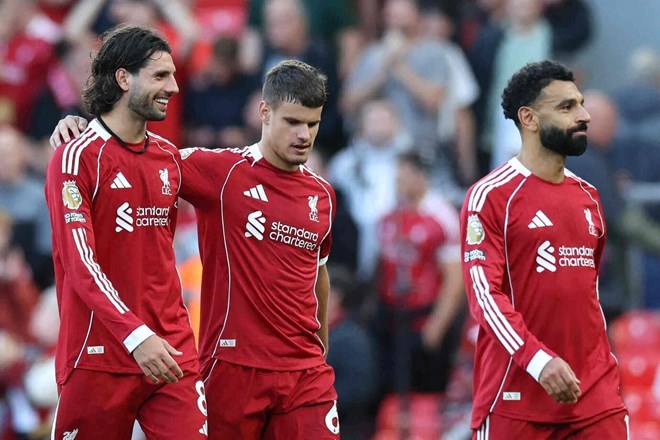Liverpool's 0-3 defeat to Manchester City left them 8 points behind leaders Arsenal, and also dropped to 8th place in the Premier League.
Coach Arne Slot's team was completely overwhelmed at the Etihad Stadium, failing to make a significant mark. Are physical problems causing them to lose their advantage in important matches?
Liverpool entered this match after a tense confrontation with Real Madrid in the Champions League. However, they still have an extra day's rest compared to Man City, who also have to compete in the European Cup.
So, do Liverpool fans have reason to worry about the team's fitness? Are their strengths in rotation and rhythm-maintaining gradually becoming weaknesses?

Is the intensity decreasing?
Both coaches were asked about the contrast in the one-on-one duels after the match. Statistics show a clear gap in success rates between the two sides.
In fact, Liverpool's 38.8% win rate in one-on-one disputes is currently the third lowest among all Premier League teams this season.
Liverpool are not the first team to face difficulties in one-on-one disputes with Man City. This season, they have been the team with the highest win percentage in one-on-one disputes in the Premier League.
Guardiola also stressed the importance of winning duels, not only helping to keep the ball under pressure but also overcoming important collisions, as the win over Liverpool showed.
However, lack of concentration without the ball has become a regular problem for Liverpool this season. Fitness - the fundamental factor that made them unique under Jurgen Klopp, Slot's predecessor - seems to be declining, with many aspects of play showing a downward trend.
Currently, the "Red Brigade" is recording fewer total tackles and blocks than in the last 7 Premier League seasons. This is a figure that clearly reflects the weakening in intensity and ability to compete.
Liverpool's passiveness was clearly shown at the Etihad Stadium. The Citizens made 17 tackles, more than double Liverpool's 8, despite the two teams having almost equal possession time.
Tracking data also shows that Guardiola's team has run 9 km more than Slot's team.
While Man City leads the Premier League in terms of average travel time in 90 minutes this season, including extra time, Liverpool is third from bottom up.

Award-competitors such as Man City and Arsenal have increased their travel distance in matches this season, while Liverpool's number has tended to decrease. And this is not the first time this has happened in recent years.
The Kop's reduced travel distance under Slot is partly due to tactics. The former Feyenoord coach has applied a tighter ball control method than his predecessor last season, helping the team save energy on the way to conquering the title.
However, at the same time, Liverpool still maintain the ability to put effective pressure. But it is difficult to say the same about their efforts this season, as many intensity and demand indicators have shown a clear decline.











